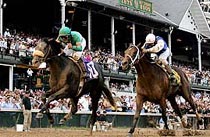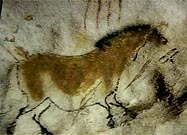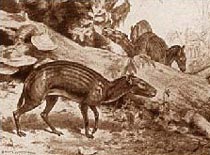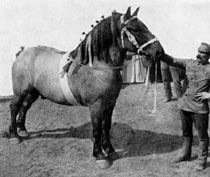| (insert your NIE or newspaper logo here) | Weekly Online LessonOnline Lesson ArchiveGrade Level: 6-8
|
A Little Horse Sense
 On Saturday, May 7, 2005, running against odds of 50-1, a horse
named Giacomo surprised the crowd when he and his jockey became the
second-longest shot to win the Kentucky Derby.
On Saturday, May 7, 2005, running against odds of 50-1, a horse
named Giacomo surprised the crowd when he and his jockey became the
second-longest shot to win the Kentucky Derby.
In the Derby's 131-year history, only one other horse has beaten tougher odds: Donerail in 1913, with the odds of winning at 91-1.
The Kentucky Derby is one example that highlights the speed, endurance and agility of horses. It also illustrates some of the long-standing relationships humans have developed with these animals.
People have bred and used horses for centuries for working, traveling, sporting events, and companionship.
To rein in some insight into the nature of our equine friends, this week you'll ride along a winding cyber-trail to explore the world of horses.
Horse History
 Let's begin our trek at the beginning of horse history, with a visit
to the Fossil
Horse Cybermuseum based in Florida.
Let's begin our trek at the beginning of horse history, with a visit
to the Fossil
Horse Cybermuseum based in Florida.
First, discover What's in a Name. What is the Latin name for the horse family?
Next, check out the Amazing Feets of horses and their relatives. What exactly are ungulates? What is the difference between an artiodactyl and a perissodactyl? Have horses always run on single-toed hooves?
Now, let's look at the Internet Browsers (and Grazers). Begin exploring the horse lineage at the bottom of the family tree, starting with Hyracotherium. Then, move up the tree to Orohippus and Mesohippus.
Follow the ancestry into the various branches and all the way up to the modern horse, Equus.
Also, review the stratigraphic layers through time along with the horse skulls.
 In what ways did the horse line change over time?
What factors, do you think, influenced the development of the physical
traits seen in modern horses? How many Equus species exist today?
In what ways did the horse line change over time?
What factors, do you think, influenced the development of the physical
traits seen in modern horses? How many Equus species exist today?
If you have time, check out the Sedimental Journey and Stratigraphy sections to review how fossils are created.
The American Horse
Now let's focus on North American horses at the PBS site, Wild Horses: An American Romance.
Read the Introduction, then get a more in-depth look a The Origin of the Horse, including the Evolution of the Horse and Equus Evolutionary Periods.
Also, watch the Migration Animation and listen to the explanation of horse evolution by Mike Voorhies (RealPlayer required).
What would have happened to the horse lineage if it hadn't spread from North America to other continents?
 Next, explore the relationships between Mustangs
and Man:
Next, explore the relationships between Mustangs
and Man:
In what ways have the roles of horses in daily life, and in human civilization overall, changed over time? How would the growth of human communities have been different without the existence of the horse?
Find out more about Mustangs and the Land, including how biologists have compiled Wild Horse Data in the Pryor Mountain Preserve in Wyoming and what they've learned about Wild Horse Herds and Harems.
What kind of social structure do horse herds have?
Next, find out about The Mustang Dilemma and Potential Solutions, including Slaughter, Birth Control, Adoption, and Sanctuary.
Which do you think would be the best solutions for managing wild horse populations?
If you have time, explore the deeper relationships of Horse and Rider, another site at PBS.
Newspaper Activities
In current issues of The Salt Lake Tribune, look for articles about different horse breeds, events that feature horses, or any stories that highlight relationships between humans and horses. How would you describe some of the physical differences among the different horse breeds? Who is breeding or keeping horses in your local area or region, and for what purposes? Also, watch for horse shows or other sporting events that feature horses. What characteristics are most prized? If you find any news articles about the wild horse population issue, what is the status of these herds and how are they being managed by government agencies? In what ways are members of the public involved in herd management?
© Copyright 2005
Learners Online, Inc.
